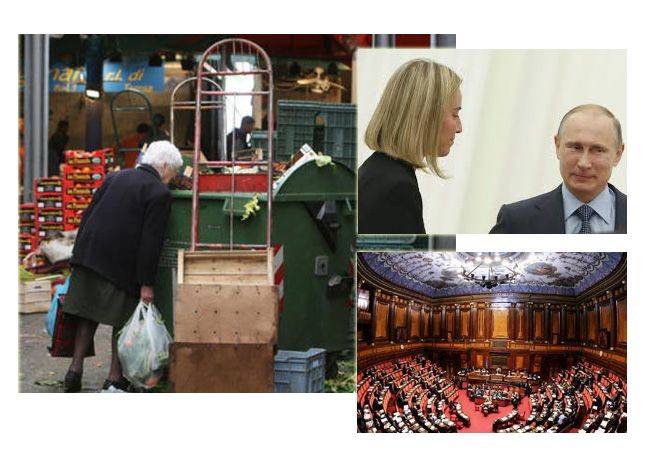Amendment Avalanche Slows Reform of the Evil Twin Senate
ROME – An avalanche of 7,830 amendments, promulgated primarily by Nikki Vendola’s left-leaning Sinistra Ecologia e Liberta’ (SEL), by rebels within Silvio Berlusconi’s Forza Italia (FI), and by a handful of dissident members of the governing Partito Democratico (PD), is hindering the much promised final vote on reform of the 315-member Italian Senate.
The aim of the reform promoted by Premier Matteo Renzi, and accepted by his cabinet July 1, is to reduce the size and revise the functions of what is denigrated here as the “paritary” Senate, long recognized as a sort of evil twin to the Chamber of Deputies; by bouncing a bill straight back to the Chamber, which then, yoyo fashion, returns it to the Senate, its effect has been to block decisions, and cripple governance,.
The Senate would be renamed the “Senate of Autonomies” and be excluded from such crucial decisions as a vote of confidence on the government and on the national budget. Because its members receive salaries as city or regional elective officials, they would receive no extra salary as senators, for a saving estimated at around $1.35 billion a year. This saving also derives from the bill’s proposed abolishment of the entire layer of provincial governments (including the scandal-ridden Lazio government) that are sandwiched between city and region; in what seems a fuzzy plan, townships would instead be allowed to assemble into self-governing, informal units.
Renzi’s project is to turn the Senate into a body composed not of directly elected senators, but a composite of those elected as city mayors or regional assembly members together with a limited number of distinguished appointees. In an effort to speed things up, debate on the first amendments just may start Monday. The final vote must be postponed until August, however, or before the Chamber shuts down for a summer holiday; and already its August agenda is blocked by other obligatory actions. The risk is that the vote may slip into September. In the words of one irate commentator, “All these amendments show that the MPs who inserted them [into the parliamentary debate] have no sense of democracy and just want to force a ‘no’ vote. Their only interest is in themselves and their ideology. They deserve the Italians’ disgust.”
The debate over the virtues, or lack thereof, of the present yoyo Senate has gone on for three decades at least, and one of its early critics was the respected Italian Communist party (PCI) leftwing leader Pietro Ingrao. The final decision on reform has repercussions that go beyond Italy itself, however. As Renzi has admitted, in the 28-member European Union, where Italy leads the pack for the next six months, the partner nations are asking whether or not reform is at all possible in Italy.
Some of those resorting to obstructionist tactics are hoping that a slow-down would also block Renzi’s efforts to revise the so-called “Porcellum” election law. But not all those opposing Senate reform can be dismissed as obstructionists, and no less than 55 amendments were presented by 16 of Renzi’s fellow members of the PD. The fact that members would not be elected to a Senate per se bothers some critics; others are battling for elections by name rather than by party. Even those who support the reform project acknowledge that it has flaws, but maintain that, at this point, it is important above all to launch a reform in order to demonstrate that reform is possible.
Renzi faces further turbulence with his proposal to make Foreign Minister Federica Mogherini, 41, the equivalent in the EU as High Representative for Foreign Policy and Joint Security. Although support – however grudging – has arrived for her candidacy from the European Socialists (PPE), the fact is that she has served only four months as foreign minister and has otherwise scant experience for a post that would require her battling into line 27 other foreign ministers. In addition, she is accused, particularly (but not only) by former East European nations now EU members of being overly tolerant of Russian President Vladimir Putin, whom she visited shortly after she was given her governing post. The fact that Renzi’s alternative candidate is Massimo D’Alema, in his youth a PCI stalwart, will do nothing to soothe those who, like the “Wall Street Journal” vehemently oppose her candidacy.
In the background of these political snafus are depressing new statistics made public this month by which show that the number of those living below the poverty line in Italy have doubled. According to the official statistics-gathering agency Istat as of July 14, over 10 million Italians live in relative poverty, of 16.6% of the population. This is cause for serious “social alarm,” warns Edoardo Capuano of the on-line magazine ECplanet. The gap between the far North and the South has not diminished: indeed, in the Southern “Mezzogiorno” it has risen form under 10% to 12.6%, involving 1.2 million people more than just one year ago. Families with three or more young children are those suffering the most.


































i-Italy
Facebook
Google+
This work may not be reproduced, in whole or in part, without prior written permission.
Questo lavoro non può essere riprodotto, in tutto o in parte, senza permesso scritto.